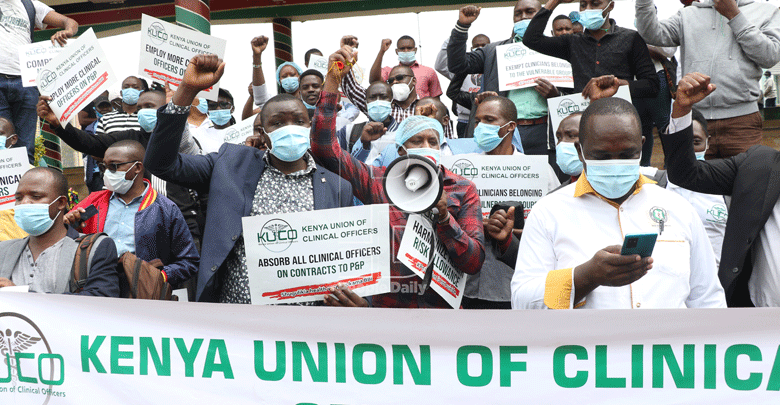Six dead, patients turned away as medics strike bite
By People Team, January 15, 2021More than six deaths have occurred at the Coast General Teaching and Referral Hospital (CGTRH) for failing to get the required medical attention due to the on-going health workers strike.
Many other patients seeking in-patient treatment continue were also turned away as the hospital’s main entrance remains shut with a padlock.
“I witnessed a patient die at the female ward because his condition was worsening and there was no doctor to assist her.
The only nurse who has been left to man the entire ward struggled to assist the patient with oxygen but she could not make it.
It was clear the nurse was overwhelmed because she was all alone,” explained Margaret Waiwa who says she was forced to leave after seeing the situation.
The hospital which is ordinarily a beehive of activities is now abandoned with less than 40 patients who were admitted before the commencement of the strike literally left on their own.
Most of the patients said they were progressing well but the crisis started after nurses started the strike and the situation degenerated from bad to worse after the doctors joined the strike.
Sources said all the remaining patients were supposed to have been discharged immediately the strike started but most of them said they still needed the care and decided to stay.
“The nurses that have been left behind can only handle minor issues like wound dressing and sort but not detailed management of patients.
For instance they cannot carry out patient reviews, surgeries, dialysis, scans and cannot handle patients who require change of medication or further investigations and such like…as a result you find that most of the patients have been left to struggle on their own and that is why some are succumbing easily,” explained a source who is familiar with the situation at the hospital.
At the maternity wing, the crisis is a fast developing. Expectant mothers are being turned away.
Unborn child
Irene Masakhwe, 28, is the latest patient to have borne the brunt of the strike after she lost her unborn child in the process of seeking assistance to deliver.
Masakhwe said she sought medical assistance at more than five hospitals all the way from Mtwapa , Kisauni and the CGTRH but she was unable to get help before she was rushed to Likoni where she finally got help but it was too late.
She said she buried the foetus near the hospital and she returned home.
This comes at a time when private hospitals in the county have reported a surge in number of patients seeking services in the past one month, amidst reports of increased cases of critical patients requiring ICU services.
“Most private hospitals have seen a surge of patients with various complications from public hospitals and ICUs are getting overwhelmed,” explained Kenya Medical Association, Mombasa branch Secretary General Dr Matagaro Omae.
In Kakamega County hundreds of patients qeued in private hospitals seeking treatment, as medics continued to stay off their work stations for nearly two months.
A spot check revealed that leading private facilities which include Sheywe Hospital, St Elizabeth Mukumu Mission Hospital, The Hamptons in Lunza, Butere and St Mary’s in Mumias had long queues.
Many patients said they had to seek treatment at the private facilities even as they were expensive saying they had no options left.
A number of medics who work in public health facilities were also present in the private hospitals where they attended to patients.
Leading public health facilities in the county such as the Kakamega Teaching and Referral Hospital, Iguhu and Malava Level Four, Shiseso and Shibuye Model Hospitals are among those affected.
Patients pleaded with the government to strike a deal with the medics so as to end the industrial action.
Kenya National Union of Nurses Kakamega County Chairman Renson Bulunya said all their members would stay at home until their demands were met.
The County Executive Committee member for Health Services Dr Collins Matemba however said the devolved units lacked the capacity to implement and sustain demands by the nurses and other health workers.
